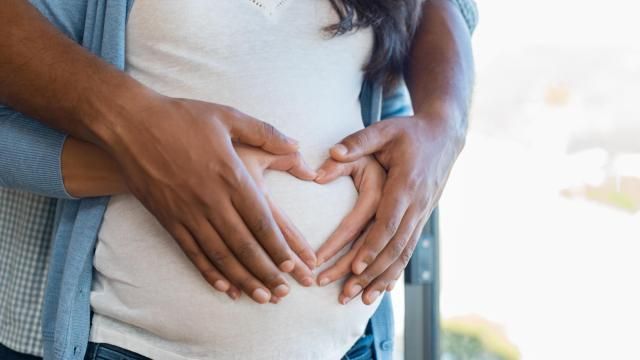New moms, here's what to know about postpartum psychosis

In recent years, there have been heartbreaking accounts of new mothers harming or killing their children and attempting or completing suicide. In these shocking news stories, experts usually attribute a mother’s actions to postpartum psychosis, a severe mental health condition that can occur after birth.
Although postpartum psychosis grabs headlines, UNC Health psychiatry specialist Anne Ruminjo, MD, says that the rate of infanticide and suicide for women with the condition is low, at 4 to 5 percent.
“We see the worst possible outcomes in the news, and they are horrific, but they are not inevitable,” she says. “It’s important to know that women with postpartum psychosis can get better with treatment.”
We talked with Dr. Ruminjo about what new parents need to know about postpartum psychosis.
What is postpartum psychosis?
Postpartum psychosis is a rare but severe psychiatric illness that can occur after delivery. It typically begins rapidly, and the highest risk is within the first four weeks after delivery. It is characterized by delusions (fixed false beliefs), hallucinations (seeing or hearing things that are not real), sleep disturbances, mood swings and disorganized behavior.
While every new parent experiences some sleep disturbances, a woman experiencing postpartum psychosis will be overly energetic and excitable despite not sleeping and can feel as though she doesn’t need to sleep. It’s important to note that delusions vary by person; while some movies and television shows depict a woman deluded into harming her child, delusions are not always violent.
These symptoms constitute a medical emergency that requires inpatient psychiatric treatment. Similarly, any mention by a parent of suicide or harming a child is a reason to seek help.
One of the main risk factors for postpartum psychosis is bipolar disorder; Dr. Ruminjo says that about 50 to 80 percent of women diagnosed with postpartum psychosis have bipolar disorder. Other risk factors include a personal or family history of postpartum psychosis, a first pregnancy, discontinuation of psychiatric medications in pregnancy, and a sensitivity to hormonal changes.
What is the difference between postpartum depression and postpartum psychosis?
Postpartum depression is much more common than postpartum psychosis.
“Postpartum depression affects 1 in 7 women, while postpartum psychosis affects 1 to 2 in 1,000 women,” Dr. Ruminjo says.
The symptoms of postpartum depression include a sad or depressed mood, crying, difficulty bonding with the baby, withdrawal from family, friends and activities that used to bring joy, changes in appetite, changes in sleep, feelings of guilt or worthlessness, and anxiety.
Women experiencing postpartum psychosis may exhibit some of the signs of postpartum depression, but the symptoms of delusions, hallucinations, impulsivity, confusion and bizarre behavior are more distinct to postpartum psychosis.
What is the treatment for postpartum psychosis?
Postpartum psychosis requires medication and inpatient treatment.
“The data supports using lithium as the gold standard for treatment for postpartum psychosis,” Dr. Ruminjo says. “Lithium is also used to prevent future episodes of postpartum psychosis in some individuals.”
Doctors will monitor lithium levels to ensure that they stay in the therapeutic range. She says most people end up on a combination of lithium and an antipsychotic medication for remission of symptoms.
“The length of an inpatient psychiatric stay is determined by need,” Dr. Ruminjo says. “Some people who respond quickly to medication might be ready for discharge within a week, but other individuals may benefit from a longer length of stay.”
What can women do about postpartum psychosis?
Many women won’t seek treatment for a postpartum mental health condition because of the stigma; they expect to feel happy and may have trouble admitting that they are struggling. It might be especially difficult to recognize or admit to the more severe symptoms of postpartum psychosis, but Dr. Ruminjo urges new parents to look beyond the horrific headlines and seek care.
“For any postpartum condition, we want women to get help,” she says. “These conditions are treatable.”
Remember it truly does take a village to raise a child.
“Women shouldn’t have to wait until they develop a psychiatric disorder in order to get support from their partners, families, friends or neighbors,” she says. “We should be checking in on new moms, making sure we are helping them get enough sleep, giving them time to do things they enjoy, and really paying attention to how they are doing.It’s important for mom to be healthy for the baby and family but also because she herself is a priority.”













